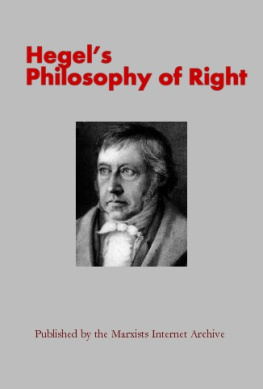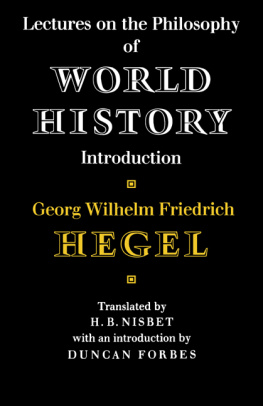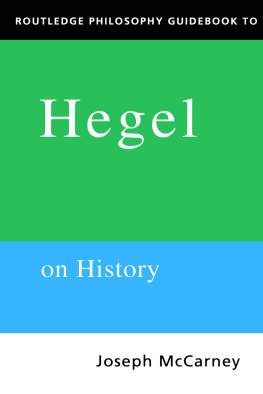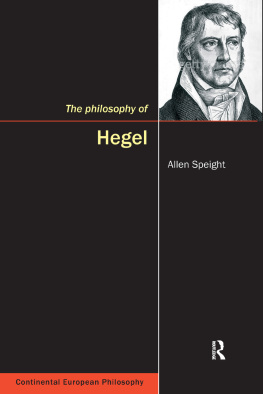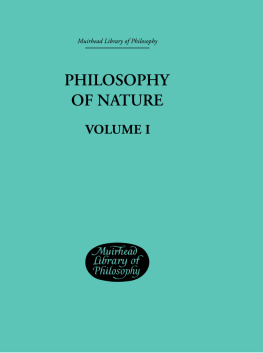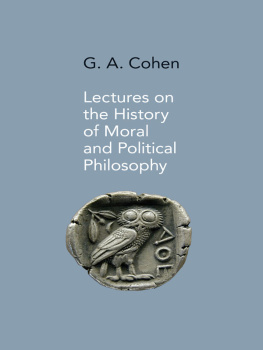G.W.F. Hegel - Lectures on the Philosophy of World History
Here you can read online G.W.F. Hegel - Lectures on the Philosophy of World History full text of the book (entire story) in english for free. Download pdf and epub, get meaning, cover and reviews about this ebook. year: 0, genre: Science. Description of the work, (preface) as well as reviews are available. Best literature library LitArk.com created for fans of good reading and offers a wide selection of genres:
Romance novel
Science fiction
Adventure
Detective
Science
History
Home and family
Prose
Art
Politics
Computer
Non-fiction
Religion
Business
Children
Humor
Choose a favorite category and find really read worthwhile books. Enjoy immersion in the world of imagination, feel the emotions of the characters or learn something new for yourself, make an fascinating discovery.
- Book:Lectures on the Philosophy of World History
- Author:
- Genre:
- Year:0
- Rating:5 / 5
- Favourites:Add to favourites
- Your mark:
- 100
- 1
- 2
- 3
- 4
- 5
Lectures on the Philosophy of World History: summary, description and annotation
We offer to read an annotation, description, summary or preface (depends on what the author of the book "Lectures on the Philosophy of World History" wrote himself). If you haven't found the necessary information about the book — write in the comments, we will try to find it.
Lectures on the Philosophy of World History — read online for free the complete book (whole text) full work
Below is the text of the book, divided by pages. System saving the place of the last page read, allows you to conveniently read the book "Lectures on the Philosophy of World History" online for free, without having to search again every time where you left off. Put a bookmark, and you can go to the page where you finished reading at any time.
Font size:
Interval:
Bookmark:
The Philosophy of History
Georg Wilhelm Friedrich Hegel
With Prefaces by Charles Hegel
and the Translator, J. Sibree, M.A.
The History of the World is not intelligible apart from a Government of the World. W. V. Humboldt
Batoche Books
Kitchener
2001
Batoche Books
52 Eby Street South
Kitchener, Ontario
N2G 3L1
Canada
email:
Hegels Lectures on the Philosophy of History are recognized in Germany as a popular introduction to his system; their form is less rigid than the generality of metaphysical treatises, and the illustrations, which occupy a large proportion of the work, are drawn from a field of observation more familiar perhaps, than any other, to those who have not devoted much time to metaphysical studies. One great value of the work is that it presents the leading facts of history from an altogether novel point of view. And when it is considered that the writings of Hegel have exercised a marked influence on the political movements of Germany, it will be admitted that his theory of the universe, especially that part which bears directly upon politics, deserves attention even from those who are the most exclusive advocates of the practical.
A writer who has established his claim to be regarded as an authority, by the life which he has infused into metaphysical abstractions, has pronounced the work before us, one of the pleasantest books on the subject he ever read.
And compared with that of most German writers, even the style may claim to be called vigorous and pointed. If therefore in its English dress the Philosophy of History should be found deficient in this respect, the fault must not be attributed to the original.
It has been the aim of the translator to present his author to the public in a really English form, even at the cost of a circumlocution which must sometimes do injustice to the merits of the original. A few words however have necessarily been used in a rather unusual sense; and one of them is of very frequent occurrence. The German Geist, in Hegels nomenclature, includes both intelligence and will, the latter even more expressly than the former. It embraces in fact mans entire mental and moral being, and a little reflection will make it obvious that no term in our metaphysical vocabulary could have been well substituted for the more theological one, Spirit, as a fair equivalent. It is indeed only the impersonal and abstract use of the term that is open to objection; an objection which can be met by an appeal to the best classical usage; viz., the rendering of the Hebrew and Greek in the authorized version of the Scriptures. One indisputable instance may suffice in confirmation: Their horses [ i.e. , of the Egyptians] are flesh and not spirit. (Isaiah xxxi. 3.) It is pertinent to remark here, that the comparative disuse of this term in English metaphysical literature, is one result of that alienation of theology from philosophy with which continental writers of the most opposite schools agree in taxing the speculative genius of Britain an alienation which mainly accounts for the gulf separating English from German speculation, and which will, it is feared, on other accounts also be the occasion of communicating a somewhat uninviting aspect to the following pages.
The distinction which the Germans make between Sittlichkeit and Moralitt, has presented another difficulty. The former denotes conventional morality, the latter that of the heart or conscience. Where no ambiguity was likely to arise, both terms have been translated morality. In other cases a stricter rendering has been given, modified by the requirements of the context. The word moment is, as readers of German philosophy are aware, a veritable crux to the translator. In Mr. J. R. Morells very valuable edition of Johnsons Translation of Tennemanns Manual of the History of Philosophy, the following explanation is given: This term was borrowed from mechanics by Hegel (see his Wissenschaft der Logik , Vol. 3, P. 104, Ed. 1841). He employs it to denote the contending forces which are mutually dependent, and whose contradiction forms an equation. Hence his formula, Esse = Nothing. Here Esse and Nothing are momentums, giving birth to Werden , i.e., Existence. Thus the momentum contributes to the same oneness of operation in contradictory forces that we see in mechanics, amidst contrast and diversity, in weight and distance, in the case of the balance. But in several parts of the work before us this definition is not strictly adhered to, and the translator believes he has done justice to the original in rendering the word by successive or organic phase. In the chapter on the Crusades another term occurs which could not be simply rendered into English. The definite, positive, and present embodiment of essential being is there spoken of as ein Dieses , das Dieses , etc., literally a This , the This , for which repulsive combination a periphrasis has been substituted, which, it i s believed, is not only accurate but expository. Paraphrastic additions , however, have been, in fairness to the reader, enclosed in brackets [ ]; and the philosophical appropriation of ordinary terms is generally indicated by capitals, e.g., Spirit, Freedom, State, Nature, etc.
The limits of a brief preface preclude an attempt to explain the Hegelian method in its wider applications; and such an undertaking is rendered altogether unnecessary by the facilities which are afforded by works so very accessible as the translation of Tennemann above mentioned, Chalybseuss Historical Development of Speculative Philosophy, from Kant to Hegel, Blakeys History of the Philosophy of Mind, Mr. Lewess Biographical History of Philosophy, besides treatises devoted more particularly to the Hegelian philosophy. Among these latter may be fairly mentioned the work of a French professor, M. Vera, Introduction a la Philosophie de Hegel , a lucid and earnest exposition of the system at large; and the very able summary of Hegels Philosophy of Right, by T. C. Sandars, late fellow of Oriel College, which forms one of the series of Oxford Essays for 1855, and which bears directly on the subject of the present volume.
It may, nevertheless, be of some service to the reader to indicate the point of view from which this Philosophy of History is composed, and to explain the leading idea.
The aim and scope of that civilizing process which all hopeful thinkers recognize in history, is the attainment of Rational Freedom. But the very term freedom supposes a previous bondage; and the question naturally arises: Bondage to what? A superficial inquirer may be satisfied with an answer referring it to the physical power of the ruling body. Such a response was deemed satisfactory by a large number of political speculators in the last century, and even at the beginning of the present; and it is one of the great merits of an influential thinker of our days to have expelled this idolum fori , which had also become an idolum theatri , from its undue position; and to have revived the simple truth that all stable organizations of men, all religious and political communities, are based upon principles which are far beyond the control of the One or the Many. And in these principles or some phase of them every man in every clime and age is born, lives and moves. The only question is: Whence are those principles derived? Whence spring those primary beliefs or superstitions, religious and political, that hold society together? They are no inventions of priestcraft or kingcraft, for to them priestcraft and kingcraft owe their power. They are no results of a Contrat Social , for with them society originates. Nor are they the mere suggestions of mans weakness, prompting him to propitiate the powers of nature, in furtherance of his finite, earthborn desires. Some of the phenomena of the religious systems that have prevailed in the world might seem thus explicable; but the Nihilism of more than one Oriental creed, the suicidal strivings of the Hindoo devotee to become absorbed in a divinity recognized as a pure negation, cannot be reduced to so gross a formula; while the political superstition that ascribes a divine right to the feebleness of a woman or an infant is altogether untouched by it. Nothing is left therefore but to recognize them as fancies, delusions, dreams, the results of mans vain imagination to class them with the other absurdities with which the abortive past of humanity is by some thought to be only too replete; or, on the other hand, to regard them as the rudimentary teachings of that essential intelligence in which mans intellectual and moral life originates. With Hegel they are the objective manifestation of infinite reason the first promptings of Him who having made of one blood all nations of men for to dwell on the face of the earth, hath determined the times before appointed , and the bounds of their habitation, if haply they might feel after and find him . And it is these , these determined and organic epochs in the history of the world that Hegel proposes to distinguish and develop in the following treatise.
Next pageFont size:
Interval:
Bookmark:
Similar books «Lectures on the Philosophy of World History»
Look at similar books to Lectures on the Philosophy of World History. We have selected literature similar in name and meaning in the hope of providing readers with more options to find new, interesting, not yet read works.
Discussion, reviews of the book Lectures on the Philosophy of World History and just readers' own opinions. Leave your comments, write what you think about the work, its meaning or the main characters. Specify what exactly you liked and what you didn't like, and why you think so.


